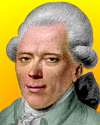 (source)
(source)
|
Georg Christoph Lichtenberg
(1 Jul 1742 - 24 Feb 1799)
German physicist and writer most widely known for his satire and aphorisms, but as a scientist, Lichtenberg did research in a wide variety of fields, including geophysics, volcanology, meteorology, chemistry, astronomy, mathematics, but especially physics. He discovered the basic physical process later used in xerographic copiers.
|
Science Quotes by Georg Christoph Lichtenberg (73 quotes)
>> Click for Georg Christoph Lichtenberg Quotes on | Belief | Discovery | Genius | Man | Nature | Science | Theory | Thinking | Truth | World |
>> Click for Georg Christoph Lichtenberg Quotes on | Belief | Discovery | Genius | Man | Nature | Science | Theory | Thinking | Truth | World |
[Someone] remarked to me once: Physicians should not say, I have cured this man, but, This man didn’t die in my care. In physics too one might say, For such and such a phenomenon I have determined causes whose absurdity cannot finally be proved, instead of saying, I have explained it.
— Georg Christoph Lichtenberg
As quoted in Joseph Peter Stern, Lichtenberg: A Doctrine of Scattered Occasions: Reconstructed From His Aphorisms and Reflections (1959), 297.
Non cogitant, ergo non sunt.
[They do not think, therefore they are not.]
[They do not think, therefore they are not.]
— Georg Christoph Lichtenberg
Aphorism 61 in Notebook J (1789-1793), as translated by R. J. Hollingdale in Aphorisms (1990). Reprinted as The Waste Books (2000), 140. (Compare René Descartes, “Cogito ergo sum”—I think, therefore I am (1637).]
A book is a mirror: when a monkey looks in, no apostle can look out.
— Georg Christoph Lichtenberg
Aphorisms (1775-1779) trans. Franz H. Mautner and Henry Hatfield. In Fred R. Shapiro and Joseph Epstein, The Yale Book of Quotations (2006), 459:2.
A donkey looks to me like a horse translated into Dutch.
— Georg Christoph Lichtenberg
Aphorisms (1775-1779) trans. Franz H. Mautner and Henry Hatfield. In Fred R. Shapiro and Joseph Epstein, The Yale Book of Quotations (2006), 459:4.
A good method of discovery is to imagine certain members of a system removed and then see how what is left would behave: for example, where would we be if iron were absent from the world: this is an old example.
— Georg Christoph Lichtenberg
Aphorism 258 in Notebook J (1789-1793), as translated by R. J. Hollingdale in Aphorisms (1990). Reprinted as The Waste Books (2000), 181.
A leg of mutton is better than nothing,
Nothing is better than Heaven,
Therefore a leg of mutton is better than Heaven.
Nothing is better than Heaven,
Therefore a leg of mutton is better than Heaven.
— Georg Christoph Lichtenberg
Aphorism 21 in Notebook C (1772-1773), as translated by R.J. Hollingdale in Aphorisms (1990). Reprinted as The Waste Books (2000), 35.
A man who writes a great deal and says little that is new writes himself into a daily declining reputation. When he wrote less he stood higher in people’s estimation, even though there was nothing in what he wrote. The reason is that then they still expected better things of him in the future, whereas now they can view the whole progression.
— Georg Christoph Lichtenberg
Aphorism 43 in Notebook D (1773-1775), as translated by R.J. Hollingdale in Aphorisms (1990). Reprinted as The Waste Books (2000), 50.
A schoolteacher or professor cannot educate individuals, he educates only species. A thought that deserves taking to heart.
— Georg Christoph Lichtenberg
Aphorism 5 in Notebook J (1789-1793), as translated by R. J. Hollingdale in Aphorisms (1990). Reprinted as The Waste Books (2000), 129.
Above all things expand the frontiers of science: without this the rest counts for nothing.
— Georg Christoph Lichtenberg
Aphorism 262 in Notebook J (1789-1793), as translated by R. J. Hollingdale in Aphorisms (1990). Reprinted as The Waste Books (2000), 181.
According to Herr Cook's observation, the inhabitants of New Guinea have something they set light to which burns up almost like gunpowder. They also put it into hollow staves, and from a distance you could believe they are shooting. But it does not produce so much as a bang. Presumably they are trying to imitate the Europeans. They have failed to realize its real purpose.
— Georg Christoph Lichtenberg
Aphorism 27 in Notebook D (1773-1775), as translated by R.J. Hollingdale in Aphorisms (1990). Reprinted as The Waste Books (2000), 48.
An increase in knowledge acquired too quickly and with too little participation on one’s own part is not very fruitful: erudition can produce foliage without bearing fruit.
— Georg Christoph Lichtenberg
Aphorism 26 in Notebook C (1772-1773), as translated by R.J. Hollingdale in Aphorisms (1990). Reprinted as The Waste Books (2000), 36.
Astrology fosters astronomy. Mankind plays its way up.
— Georg Christoph Lichtenberg
The original German “Astrologie fördert Astronomie. Die Menschen spielen sich in die Höhe,” appears in Ernst Volkmann (ed.), Aphorismen: Eine Sammlung aus Lichtenbergs Gedankenbüchern (1944), 85. However, so far, this is the only German source found by Webmaster. English as gived in H.W. Auden, The Faber Book of Aphorisms (1962), 261.
Astronomy is perhaps the science whose discoveries owe least to chance, in which human understanding appears in its whole magnitude, and through which man can best learn how small he is.
— Georg Christoph Lichtenberg
Aphorism 23 in Notebook C (1772-1773), as translated by R.J. Hollingdale in Aphorisms (1990). Reprinted as The Waste Books (2000), 35.
Devised with a maximum of erudition and a minimum of common sense.
— Georg Christoph Lichtenberg
Aphorism 56 in Notebook D (1773-1775), as translated by R.J. Hollingdale in Aphorisms (1990). Reprinted as The Waste Books (2000), 52.
Do not say hypothesis, and even less theory: say way of thinking.
— Georg Christoph Lichtenberg
Aphorism 263 in Notebook J (1789-1793), as translated by R. J. Hollingdale in Aphorisms (1990). Reprinted as The Waste Books (2000), 181.
Everyone is a genius at least once a year. The real geniuses simply have their bright ideas closer together.
— Georg Christoph Lichtenberg
Aphorisms (1775-1779) trans. Franz H. Mautner and Henry Hatfield. In Fred R. Shapiro and Joseph Epstein, The Yale Book of Quotations (2006), 459:3.
Everywhere in nature we seek some certainty, but all this is nothing more than an arrangement of the dark feeling of our own. All the mathematical laws that we find in Nature are always suspicious to me, despite their beauty. They give me no pleasure. They are merely expedients. Everything is not true at close range.
— Georg Christoph Lichtenberg
From the original German, in Physikalische und Mathematische Schriften (1806), Vol. 4, 145, “Wir suchen in der Natur überall eine gewisse Bestimmtheit, aber das Alles ist weiter nichts, als Anordnung des dunkeln Gefühls unserer eigenen. Alle mathematischen Gesetze, die wir in der Natur finden, sind mir trotz ihrer Schönheit immer verdächtig. Sie Freuen mich nicht. Sie sind bloss Hülfsmittel. In der Nähe ist Alles nicht wahr.” English version by Webmaster using Google translate.
God created man in his own image, says the Bible; the philosophers do the exact opposite, they create God in theirs.
— Georg Christoph Lichtenberg
Aphorism 48 in Notebook D (1773-1775), as translated by R.J. Hollingdale in Aphorisms (1990). Reprinted as The Waste Books (2000), 51.
He had constructed for himself a certain system which thereafter exercised such an influence on his way of thinking that those who observed him always saw his judgment walking a few steps in front of his feeling, though he himself believed it was keeping to the rear.
— Georg Christoph Lichtenberg
Aphorism 82 in Notebook D (1773-1775), as translated by R.J. Hollingdale in Aphorisms (1990). Reprinted as The Waste Books (2000), 56-57.
He marvelled at the fact that the cats had two holes cut in their fur at precisely the spot where their eyes were.
— Georg Christoph Lichtenberg
Aphorisms, trans. R. J. Hollingdale (1990), 108.
Hour-glasses remind us, not only of how time flies, but at the same time of the dust into which we shall one day decay.
— Georg Christoph Lichtenberg
Aphorism 4 in Notebook C (1772-1773), as translated by R.J. Hollingdale in Aphorisms (1990). Reprinted as The Waste Books (2000), 31.
How might letters be most efficiently copied so that the blind might read them with their fingers?
— Georg Christoph Lichtenberg
Aphorism 28 in Notebook J (1789-1793), as translated by R. J. Hollingdale in Aphorisms (1990). Reprinted as The Waste Books (2000), 133.
I have often noticed that when people come to understand a mathematical proposition in some other way than that of the ordinary demonstration, they promptly say, “Oh, I see. That’s how it must be.” This is a sign that they explain it to themselves from within their own system.
— Georg Christoph Lichtenberg
Lichtenberg: A Doctrine of Scattered Occasions: Reconstructed From: Reconstructed From His Aphorisms and Reflections (1959), 291.
I have very often reflected on what it is that really distinguishes the great genius from the common crowd. Here are a few observations I have made. The common individual always conforms to the prevailing opinion and the prevailing fashion; he regards the State in which everything now exists as the only possible one and passively accepts it ail. It does not occur to him that everything, from the shape of the furniture up to the subtlest hypothesis, is decided by the great council of mankind of which he is a member. He wears thin-soled shoes even though the sharp stones of the Street hurt his feet, he allows fashion to dictate to him that the buckles of his shoes must extend as far as the toes even though that means the shoe is often hard to get on. He does not reflect that the form of the shoe depends as much upon him as it does upon the fool who first wore thin shoes on a cracked pavement. To the great genius it always occurs to ask: Could this too not be false! He never gives his vote without first reflecting.
— Georg Christoph Lichtenberg
Aphorism 24 in Notebook C (1772-1773), as translated by R.J. Hollingdale in Aphorisms (1990). Reprinted as The Waste Books (2000), 36.
I imagine that when we reach the boundaries of things set for us, or even before we reach them, we can see into the infinite, just as on the surface of the earth we gaze out into immeasurable space.
— Georg Christoph Lichtenberg
Aphorism 52 in Notebook D (1773-1775), as translated by R.J. Hollingdale in Aphorisms (1990). Reprinted as The Waste Books (2000), 51.
I know very well the people you mean: they are all mind and theory and haven't the wit to sew on a button. Plenty of head but not hand enough to sew on a button.
— Georg Christoph Lichtenberg
Aphorism 75 in Notebook D (1773-1775), as translated by R.J. Hollingdale in Aphorisms (1990). Reprinted as The Waste Books (2000), 55.
I once lodged in Hanover in a room whose window gave on to a narrow Street which formed a communicating link between two bigger streets. It was very pleasant to see how people's faces changed when they entered the little Street, where they thought they were less observed; how here one pissed, there another fixed her garter, one gave way to private laughter and another shook his head. Girls thought with a smile of the night before and adjusted their ribbons for conquests in the big Street ahead.
— Georg Christoph Lichtenberg
Aphorism 19 in Notebook C (1772-1773), as translated by R.J. Hollingdale in Aphorisms (1990). Reprinted as The Waste Books (2000), 34.
If an angel were to tell us about his philosophy, I believe many of his statements might well sound like '2 x 2= 13'.
— Georg Christoph Lichtenberg
Lichtenberg: Aphorisms & Letters (1969), 31.
If it were true what in the end would be gained? Nothing but another truth. Is this such a mighty advantage? We have enough old truths still to digest, and even these we would be quite unable to endure if we did not sometimes flavor them with lies.
— Georg Christoph Lichtenberg
Aphorism 10 in Notebook E (1775-1776), as translated by R.J. Hollingdale in Aphorisms (1990). Reprinted as The Waste Books (2000), 63.
If we make a couple of discoveries here and there we need not believe things will go like this for ever. An acrobat can leap higher than a farm-hand, and one acrobat higher than another, yet the height no man can overleap is still very low. Just as we hit water when we dig in the earth, so we discover the incomprehensible sooner or later.
— Georg Christoph Lichtenberg
Aphorisms, trans. R. J. Hollingdale (1990), 92.
Imagine the world so greatly magnified that particles of light look like twenty-four-pound cannon balls.
— Georg Christoph Lichtenberg
As given, without source, in James Geary, Geary's Guide to the World's Great Aphorists (2008), 341.
In mathematical analysis we call x the undetermined part of line a: the rest we don’t call y, as we do in common life, but a-x. Hence mathematical language has great advantages over the common language.
— Georg Christoph Lichtenberg
Lichtenberg: A Doctrine of Scattered Occasions: Reconstructed From: Reconstructed From His Aphorisms and Reflections (1959), 158.
In the republic of scholarship everybody wants to rule, there are no aldermen there, and that is a bad thing: every general must, so to speak, draw up the plan, stand sentry, sweep out the guardroom and fetch the water; no one wants to work for the good of another.
— Georg Christoph Lichtenberg
Aphorism 80 in Notebook D (1773-1775), as translated by R.J. Hollingdale in Aphorisms (1990). Reprinted as The Waste Books (2000), 56.
It is a good thing Heaven has not given us the power to change as much of our body as we would like to or as our theory would assert is necessary.
— Georg Christoph Lichtenberg
Aphorism 34 in Notebook D (1773-1775), as translated by R.J. Hollingdale in Aphorisms (1990). Reprinted as The Waste Books (2000), 48.
It is astonishing how much the word infinitely is misused: everything is infinitely more beautiful, infinitely better, etc. The concept must have something pleasing about it, or its misuse could not have become so general.
— Georg Christoph Lichtenberg
Aphorism 133 in Notebook J (1789-1793), as translated by R. J. Hollingdale in Aphorisms (1990). Reprinted as The Waste Books (2000), 155.
It is the geniuses who, as pioneers, create the highways, and the cultivated who level and beautify them. Highway improvement would be a good thing in the sciences, so that we could get from one of them to another more easily.
— Georg Christoph Lichtenberg
Aphorism 39 in Notebook D (1773-1775), as translated by R.J. Hollingdale in Aphorisms (1990). Reprinted as The Waste Books (2000), 49.
It is very much in the order of nature that toothless animals should have horns: is it any wonder that old men and women should often have them?
— Georg Christoph Lichtenberg
Aphorism 6 in Notebook E (1775-1776), as translated by R.J. Hollingdale in Aphorisms (1990). Reprinted as The Waste Books (2000), 62.
Libraries will in the end become cities, said Leibniz.
— Georg Christoph Lichtenberg
Aphorism 29 in Notebook C (1772-1773), as translated by R.J. Hollingdale in Aphorisms (1990). Reprinted as The Waste Books (2000), 37.
Man is perhaps half spirit and half matter, as the polyp is half plant and half animal. The strangest of creatures lie always at the boundary.
— Georg Christoph Lichtenberg
Aphorism 30 in Notebook D (1773-1775), as translated by R.J. Hollingdale in Aphorisms (1990). Reprinted as The Waste Books (2000), 48.
Many people know everything they know in the way we know the solution of a riddle after we have read it or been told it, and that is the worst kind of knowledge and the kind least to be cultivated; we ought rather to cultivate that kind of knowledge which enables us to discover for ourselves in case of need that which others have to read or be told of in order to know it.
— Georg Christoph Lichtenberg
Aphorism 89 in Notebook D (1773-1775), as translated by R.J. Hollingdale in Aphorisms (1990). Reprinted as The Waste Books (2000), 58.
Metaphorical language is a species of natural language which we construct out of arbitrary but concrete words. That is why it is so pleasing.
— Georg Christoph Lichtenberg
Aphorism 78 in Notebook D (1773-1775), as translated by R.J. Hollingdale in Aphorisms (1990). Reprinted as The Waste Books (2000), 56.
My head lies at least a foot closer to my heart than is the case with other men: that is why I am so reasonable.
— Georg Christoph Lichtenberg
Aphorism 2 in Notebook C (1772-1773), as translated by R.J. Hollingdale in Aphorisms (1990). Reprinted as The Waste Books (2000), 31.
Now that we know nature thoroughly, a child can see that in making experiments we are simply paying nature compliments. It is no more than a ceremonial ritual. We know the answers in advance. We consult nature in the same way as great rulers consult their parliaments.
— Georg Christoph Lichtenberg
Aphorism 67 in Notebook E (1775-1776), as translated by R.J. Hollingdale in Aphorisms (1990). Reprinted as The Waste Books (2000), 73.
Of all the animals on earth, man is closest to the ape.
— Georg Christoph Lichtenberg
Aphorism 19 in Notebook B (1768-1771), as translated by R.J. Hollingdale in Aphorisms (1990). Reprinted as The Waste Books (2000), 21.
One has to do something new in order to see something new.
— Georg Christoph Lichtenberg
Aphorism from Notebook J (1789).
Our world will yet grow so subtle that it will be as ludicrous to believe in a god as it is today to believe in ghosts.
— Georg Christoph Lichtenberg
Aphorism 57 in Notebook D (1773-1775), as translated by R.J. Hollingdale in Aphorisms (1990). Reprinted as The Waste Books (2000), 52.
People who have read a great deal seldom make great discoveries. I do not say this to excuse laziness, for invention presupposes an extensive contemplation of things on one's own account; one must see for oneself more than let oneself be told.
— Georg Christoph Lichtenberg
Aphorism 85 in Notebook E (1775-1776), as translated by R.J. Hollingdale in Aphorisms (1990). Reprinted as The Waste Books (2000), 77.
Scholars should always receive with thanks new suppositions about things, provided they possess some tincture of sense; another head may often make an important discovery prompted by nothing more than such a stimulus: the generally accepted way of explaining a thing no longer had any effect on his brain and could communicate to it no new notion.
— Georg Christoph Lichtenberg
Aphorism 81 in Notebook D (1773-1775), as translated by R.J. Hollingdale in Aphorisms (1990). Reprinted as The Waste Books (2000), 56.
That is as natural to man as thinking or throwing snowballs.
— Georg Christoph Lichtenberg
Aphorism 18 in Notebook C (1772-1773), as translated by R.J. Hollingdale in Aphorisms (1990). Reprinted as The Waste Books (2000), 34.
That man is the noblest creature may also be inferred from the fact that no other creature has yet contested this claim.
— Georg Christoph Lichtenberg
Aphorism 58 in Notebook D (1773-1775), as translated by R.J. Hollingdale in Aphorisms (1990). Reprinted as The Waste Books (2000), 52.
The accomplishments of those born blind are a sure proof of how much the spirit can achieve when difficulties are placed in its way.
— Georg Christoph Lichtenberg
Aphorism 50 in Notebook D (1773-1775), as translated by R.J. Hollingdale in Aphorisms (1990). Reprinted as The Waste Books (2000), 51.
The construction of the universe is certainly very much easier to explain than is that of the plant.
— Georg Christoph Lichtenberg
Aphorism 4 in Notebook J (1789-1793), as translated by R. J. Hollingdale in Aphorisms (1990), 119. Reprinted as The Waste Books (2000), 128.
The great artifice of regarding small deviations from the truth as being the truth itself is at the same time the foundation of wit, where the whole thing would often collapse if we were to regard these deviations in a spirit of philosophical rigor.
— Georg Christoph Lichtenberg
Aphorism from Georg Christoph Lichtenberg and R.J. Hollingdale (trans.) 'Notebook A: 1765-1770', The Waste Books (1990), 4. Also seen translated as, “The great trick of regarding small departures from the truth as the truth itself—on which is founded the entire integral calculus—is also the basis of our witty speculations, where the whole thing would often collapse if we considered the departures with philosophical rigour,” for example, as quoted in FractalVision: Put Fractals to Work For You (1992), 5, citing Aphorisms: 1764-1799.
The great rule: If the little bit you have is nothing special in itself, at least find a way of saying it that is a little bit special.
— Georg Christoph Lichtenberg
Aphorism 55 in Notebook E, as translated by R.J. Hollingdale in Aphorisms (1990).
The man was such an intellectual he was of almost no use.
— Georg Christoph Lichtenberg
Aphorism 74 in Notebook D (1773-1775), as translated by R.J. Hollingdale in Aphorisms (1990). Reprinted as The Waste Books (2000), 55.
The more experiences and experiments accumulate in the exploration of nature, the more precarious the theories become. But it is not always good to discard them immediately on this account. For every hypothesis which once was sound was useful for thinking of previous phenomena in the proper interrelations and for keeping them in context. We ought to set down contradictory experiences separately, until enough have accumulated to make building a new structure worthwhile.
— Georg Christoph Lichtenberg
Lichtenberg: Aphorisms & Letters (1969), 61.
The most dangerous untruths are truths slightly distorted.
— Georg Christoph Lichtenberg
Aphorism 7 in Notebook H, as translated by R.J. Hollingdale in Aphorisms (1990).
The most heated defenders of a science, who cannot endure the slightest sneer at it, are commonly those who have not made very much progress in it and are secretly aware of this defect.
— Georg Christoph Lichtenberg
Aphorism 8 in Notebook F, as translated by R.J. Hollingdale in Aphorisms (1990), 82.
The natural scientists of the previous age knew less than we do and believed they were very close to the goal: we have taken very great steps in its direction and now discover we are still very far away from it. With the most rational philosophers an increase in their knowledge is always attended by an increased conviction of their ignorance.
— Georg Christoph Lichtenberg
Aphorisms, trans. R. J. Hollingdale (1990), 89.
There are people who possess not so much genius as a certain talent for perceiving the desires of the century, or even of the decade, before it has done so itself.
— Georg Christoph Lichtenberg
Aphorism 70 in Notebook D (1773-1775), as translated by R.J. Hollingdale in Aphorisms (1990). Reprinted as The Waste Books (2000), 55.
There are two ways of extending life: firstly by moving the two points “born” and “died” farther away from one another… The other method is to go more slowly and leave the two points wherever God wills they should be, and this method is for the philosophers.
— Georg Christoph Lichtenberg
Aphorism 22 in Notebook B (1768-1771), as translated by R.J. Hollingdale in Aphorisms (1990). Reprinted as The Waste Books (2000), 21.
There are very few things of which we can acquire a conception through all five senses.
— Georg Christoph Lichtenberg
Aphorism 9 in Notebook B (1768-1771), as translated by R.J. Hollingdale in Aphorisms (1990). Reprinted as The Waste Books (2000), 17.
There is no greater impediment to progress in the sciences than the desire to see it take place too quickly.
— Georg Christoph Lichtenberg
Aphorism 72 in Notebook K, as translated by R.J. Hollingdale in Aphorisms (1990).
To do just the opposite is also a form of imitation.
— Georg Christoph Lichtenberg
Aphorisms (1775-1779) trans. Franz H. Mautner and Henry Hatfield. In Fred R. Shapiro and Joseph Epstein, The Yale Book of Quotations (2006), 459:1.
To see every day how people get the name “genius” just as the wood-lice in the
cellar the name “millipede”—not because they have that many feet, but because most people don't want to count to 14—this has had the result that I don't believe anyone any more without checking.
— Georg Christoph Lichtenberg
Lichtenberg: Aphorisms & Letters (1969), 48, translated by Franz H. Mautner and Henry Hatfield.
We have to believe that everything has a cause, as the spider spins its web in order to catch flies. But it does this before it knows there are such things as flies.
— Georg Christoph Lichtenberg
Aphorisms, trans. R. J. Hollingdale (1990), 112.
What we have to discover for ourselves leaves behind in our mind a pathway that can be used on another occasion.
— Georg Christoph Lichtenberg
Aphorism 26 in Notebook C (1772-1773), as translated by R.J. Hollingdale in Aphorisms (1990). Reprinted as The Waste Books (2000), 36.
When one begins to speak of something it sounds plausible, but when we reflect on it we find it false. The initial impression a thing makes on my mind is very important. Taking an overall view of a thing the mind sees every side of it obscurely, which is often of more value than a clear idea of only one side of it.
— Georg Christoph Lichtenberg
Aphorism 47 in Notebook D (1773-1775), as translated by R.J. Hollingdale in Aphorisms (1990). Reprinted as The Waste Books (2000), 50-51.
When they have discovered truth in nature they fling it into a book, where it is in even worse hands.
— Georg Christoph Lichtenberg
Aphorism 62 in Notebook E (1775-1776), as translated by R.J. Hollingdale in Aphorisms (1990). Reprinted as The Waste Books (2000), 73.
When they saw they would never be able to set a Catholic head on his shoulders they at least struck off the Protestant one.
— Georg Christoph Lichtenberg
Aphorism 94 in Notebook D (1773-1775), as translated by R.J. Hollingdale in Aphorisms (1990). Reprinted as The Waste Books (2000), 59.
Where a body is in motion, there exists space and time, the simplest sentient creature in this world would thus be a measure of them. Our hearing, and perhaps our seeing too, consists of a counting of oscillations.
— Georg Christoph Lichtenberg
Aphorism 54 in Notebook D (1773-1775), as translated by R.J. Hollingdale in Aphorisms (1990). Reprinted as The Waste Books (2000), 52.
Why does a suppurating lung give so little warning and a sore on the finger so much?
— Georg Christoph Lichtenberg
Aphorism 3 in Notebook J (1789-1793), as translated by R. J. Hollingdale in Aphorisms (1990). Reprinted as The Waste Books (2000), 128.
You can be sure you are acting in accordance with the designs of nature if what you do is calculated to promote nature's great final purpose: grow and make grow. I am firmly convinced of the universality of this law.
— Georg Christoph Lichtenberg
Aphorism 44 in Notebook D (1773-1775), as translated by R.J. Hollingdale in Aphorisms (1990). Reprinted as The Waste Books (2000), 50.
See also:
- 1 Jul - short biography, births, deaths and events on date of Lichtenberg's birth.
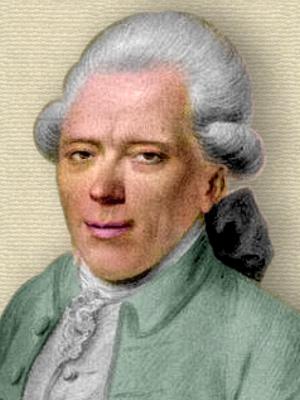

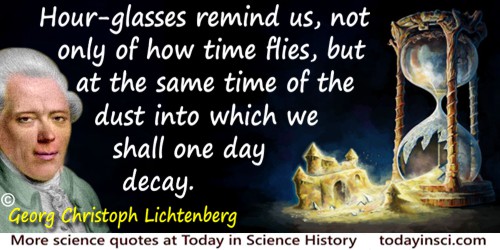


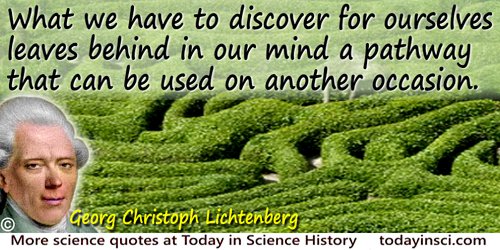

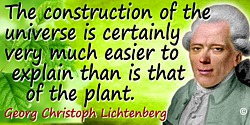
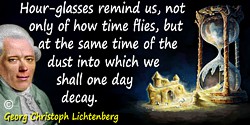
 In science it often happens that scientists say, 'You know that's a really good argument; my position is mistaken,' and then they would actually change their minds and you never hear that old view from them again. They really do it. It doesn't happen as often as it should, because scientists are human and change is sometimes painful. But it happens every day. I cannot recall the last time something like that happened in politics or religion.
(1987) --
In science it often happens that scientists say, 'You know that's a really good argument; my position is mistaken,' and then they would actually change their minds and you never hear that old view from them again. They really do it. It doesn't happen as often as it should, because scientists are human and change is sometimes painful. But it happens every day. I cannot recall the last time something like that happened in politics or religion.
(1987) -- 


